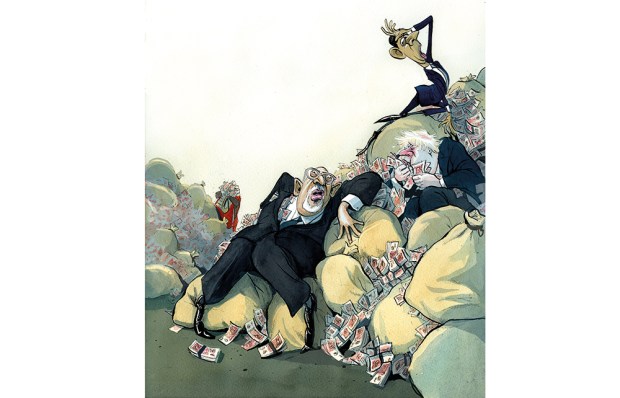In a few weeks’ time, police across the country will receive a new order: ‘Investigate every crime’. It may not sound like a novel concept, but over the past few years forces – including the Metropolitan Police – have largely given up on low-level crime. Austerity was seen as a reason to ignore burglaries, thefts and minor assaults if officers believed there was little chance of identifying a suspect. But now a new theory is about to be put into practice: that investigations will lead not just to more convictions, but to more deterrence.
This change in tack – which will see police chiefs look into all crimes where there is a reasonable lead, such as video footage or a GPS tracker on a stolen phone – isn’t an idea devised in a Westminster thinktank or even a Whitehall department. Instead, it comes from Greater Manchester. It is a model put in place by Steve Watson when he took over as chief constable two years ago. At the time, the force was in special measures. But in just 18 months it was removed from enhanced monitoring after it halved the number of open investigations, shortened response times and improved support for staff. Watson’s tactics were to make more arrests, follow up every burglary and get his officers off Twitter.
Watson is one of a handful of standout chief constables to whom Suella Braverman, the Home Secretary, is paying close attention as the Tories prepare to fight on the issue of crime at the next election. Glance at the figures and the government ought to have a positive story to tell. According to the Office for National Statistics, surveyed crime (excluding fraud and computer misuse) has halved since 2010. Earlier this year, HM Chief Inspector of Constabulary Andy Cooke declared in his annual report that ‘England and Wales are arguably safer than they have ever been’.
So why aren’t the Tories shouting this from the rooftops? ‘It’s not clear people feel it,’ says one government insider. While police-recorded incidents of antisocial behaviour are down from 2012, self-reported experiences are up. There is a sense that some theft has effectively been decriminalised in much of the country. A YouGov poll has found that most people don’t think the police will bother with crimes such as phone snatching or bicycle theft. They have a point. Almost 90 per cent of bike thefts went unsolved last year; just 2 per cent led to charges being brought.
It’s hard to argue that this is a golden age for policing, with six of England and Wales’s 43 forces in special measures (and that’s without mentioning the numerous individual reports of police misconduct). Indeed, much of the innovation has been born out of crisis. This was the case in Humberside when the departing chief constable Lee Freeman created a new initiative that relieved police of attending most mental health call-outs in a bid to free up time so the then failing force could focus on crime. He asked staff what would make a difference quickly. ‘What came out of it was, we are not doing the job that we signed up to do.’ Officers were waiting in A&E with people and losing time on the beat.
‘The public said we weren’t taking action [on crime]. My workforce were saying we can’t do that because we’re sat doing bed watches for people who have got a mental health crisis,’ Freeman explains. ‘We’re not the right people to deal with it. If I slipped and broke my ankle in the street, I wouldn’t end up in a police van.’ This is a dysfunction that even made it into the script of the BBC police drama Blue Lights. A police officer encourages someone to claim he’s mentally ill so she can avoid work and sit with him in hospital instead.
Known as ‘right care, right person’, the Humberside scheme is due to hit the Met next month, before being rolled out across the country in a bid to save a million hours of police time every year.
So changes are now being driven regionally rather than nationally. This bottom-up innovation is precisely what the Tories wanted to effect in 2012 when David Cameron introduced the 41 directly elected police and crime commissioners. Their model was the New York police commissioner, Bill Bratton, whose ‘broken windows’ theory of investigating even comparatively minor offences turned around crime in the city. But 11 years later, few would say Cameron’s commissioners have worked out as planned: it’s hard to point to much innovation that their largely toothless elected officers have introduced.
As home secretary, Theresa May sought to confront the police, telling them in a 2010 speech ‘don’t chase targets, cut crime’. This ended Labour’s police targets regime, ruffling the feathers of chief constables, with one complaining that May knew nothing about policing. ‘It showed how strategically unfocused the police are,’ recalls a senior Tory. ‘They want to play games with big operations rather than focus on burglaries and street crime. They think they are leaders and behave like management consultants.’
Under Boris Johnson’s premiership the focus moved back to police numbers – with a New Labour-style pledge to find 20,000 new officers. Under Sunak and Braverman, protest laws have been tightened. Since the increased public order powers, it takes an average of eight minutes for the police to clear slow-walking protestors such as those from Just Stop Oil.
This is a back-to-basics policing strategy – not that the Tories would use the phrase. The government is trying to learn from chief constables and wants to roll out the lessons nationwide. The officers whose advice is being sought are, according to one government figure, the ones not pandering to ‘the Guardian and the Twitterati’. Braverman is particularly exercised by coppers ‘performatively making political points, taking the knee or opposing gender-critical views on Twitter’. ‘The police should stay out of politics and focus on the basics,’ says a senior government source.
Watson, 55, is seen as the chief supercop. Sometimes referred to as ‘the anti-woke chief constable’, he has quickly amassed fans in the Tory party with his declarations that all staff should shine their shoes, stop virtue-signalling online and focus on doing the job. ‘I am not employed to be a diversity champion,’ he declared after his appointment. ‘I am employed to be the chief constable of Greater Manchester.’ He began his career in Lancashire before going to the Met – a force that few can find much positive to say about – and then overhauled South Yorkshire Police, which was struggling with the fallout from failures in its handling of sexual abuse.
It was a Labour mayor, Andy Burnham, who appointed Watson to Greater Manchester. On arrival, Watson quickly got rid of his predecessor’s ‘Citizens’ Contract’ – reminding the public of their duty to stay safe as his staff were overstretched – on the grounds that it was ‘just complete tosh’. Results have been fast: non-urgent 999 calls have gone down from a wait of more than a day to just over two hours. Watson’s demand for police to attend every burglary – to get to the scene quickly, within the ‘golden hour’ for making a breakthrough – was his trademark reform.
‘I checked with Stephen early on around his theory of policing and I asked “Do you support the broken windows theory?”’ Burnham says, when we speak. ‘Because I always have, it always made sense to me. He said that he did, so immediately we were in the same place.’ At the launch of Watson’s Operation Vulcan, aimed at dismantling organised crime gangs in the Cheetham Hill area, he promised nothing would be neglected, so ‘the person who’s fishing in the Irwell every Tuesday afternoon better have a rod licence’.
Stop and search, which May had regarded as discriminatory, has trebled over the past two years. Does it disproportionately target any group, as critics claim? In a bid to respond to concerns, the tactic is now measured on what percentage of searches yields results: success comes if that figure is stable (and all officers record searches with a body camera).
Burnham is a fan of local policies going national. ‘If you’re going to take policy made up in a room in Whitehall and drop it on everybody, there’s a fair chance it’s not going to work,’ he says. ‘I would give the government credit for their openness in taking some of these ideas.’
In Humberside, Freeman says his mental health reform came in part from a wish to return to traditional policing. ‘It was a desire to get back to basics even before back to basics became a thing – that was our plan in 2017,’ he says. He dismisses criticism that the policy could lead to problems for the mentally ill. ‘What’s really fascinating is reading some of the national headlines and narrative about everybody saying “This is really worrying – the police can’t just slip away”,’ he explains. ‘Well, we’ve been doing this for three years and the only pushback I ever got was initially from the other agencies who suddenly realised that if we’re going to stop doing this, we’re entering into a project with them that is going to give them some deadlines. I was very flexible about those deadlines because I didn’t want to create risk. But I had no pushback from the communities.’
Freeman’s force has gone from failing status five years ago to being rated outstanding by the policing inspectorate. It has the highest arrest rate in the country. Freeman credits the government for providing the ‘political will’ to enable ‘operational practitioners like myself’. He talks of the ‘benefits to the police of starting to do clearly what the government wants us to do and what the public wants us to do, which is get back to preventing crime, reducing crime, detecting crime and increasing trust – which quite frankly has taken a battering.’
Other chief constables that ministers are paying close attention to include Lauren Poultney, Watson’s successor in South Yorkshire. She has retained his spirit of reform, with the force receiving three ‘outstanding’ grades in its most recent inspection for preventing crime, protecting vulnerable people and the good use of resources.
Deterrence theory ultimately rests on three components: certainty (that a punishment will be imposed), celerity (that it will be imposed quickly) and severity (that it will put off others). The last of these is an area where the Tories plan to go further, with at least two bills planned for the King’s Speech on crime and tougher sentences – although questions remain over the number of available prison places to match the drive.
For the strategy to work, the quality of policing is vital. Which is why the Tories’ reputation on crime rests in the hands of these enterprising supercops.
Got something to add? Join the discussion and comment below.
Get 10 issues for just $10
Subscribe to The Spectator Australia today for the next 10 magazine issues, plus full online access, for just $10.
You might disagree with half of it, but you’ll enjoy reading all of it. Try your first month for free, then just $2 a week for the remainder of your first year.















Comments
Don't miss out
Join the conversation with other Spectator Australia readers. Subscribe to leave a comment.
SUBSCRIBEAlready a subscriber? Log in